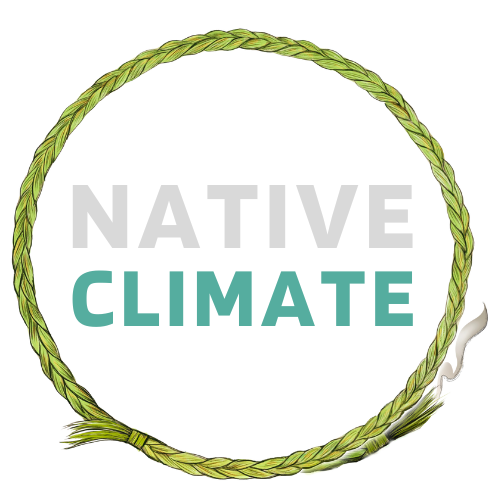
Select Page

Credit: Bureau of Land Management
The Native Climate education group works collaboratively with teachers, informal educators, and Indigenous knowledge holders across the Intermountain West to adapt climate education resources to be rooted in Indigenous practices and knowledge. Indigenous knowledge is the product of thousands of years of information sharing and observation, and it acts as an invaluable look into human’s interaction with the environment. With a foundation in Indigenous practices, educators and education partners can use place-based, experiential learning to support climate resilience at the local and regional levels.
Education resources are shared via Native Climate’s annual summits and workshops, as well as through opportunities designed specifically for K-12 educators. Through sharing these resources with Tribes, we aim to foster climate awareness and action among Native American youth, who will be leaders in the ongoing effort to build climate resilience. Resources will also be distributed widely to increase awareness of the impacts of the climate crisis on Native American communities and to encourage respect for Indigenous knowledge and practices among western scientists and the public.
The Teaching Native Waters program was operated through Native Waters on Arid Lands and provided professional development to educators serving native students. The website includes recordings of those PD sessions, focused on climate topics important to tribal communities and suggestions for classroom implementation. To access the recordings, follow the link and then open the resources tabs at the bottom.
Teaching materials from the Native Climate team, the Teaching Native Waters program, and outside organizations which address the climate crisis.
Grade: Middle
Topics: Microplastics, Molecular structures, Ecology
Grade: Middle, High
Topic: Various, research project
Grade: Elementary
Topic: Molecular Structure of Water, Density Watershed Mapping, Indigenous Waters, Political Activism
Grade: High
Topics: Traditional Fire, Air Quality Index, Respiratory System, Homeostasis, Air Filtration, Purple Air Monitor, Health Effects of Smoke
Grade: High
Topics: Water Characteristics, Weather and Climate, Water Cycles and Watersheds, Climate Models, Water Abundance, Water for Life, Water and Transportation, Water and Energy, Water Quality, Water Regulations
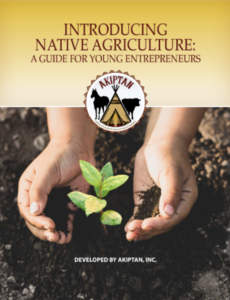
Description:
Akiptan has developed this guide to help young entrepreneurs with Native agriculture projects, those who are thinking about Native agriculture, and those who want to learn more about it. We believe that a strong financial foundation (understanding the financial aspects of Native agriculture) is key to success!
Authors/Producers:
Akiptan, Inc.
Grade Level:
Middle/High
Next Gen Science Standards:
Economics
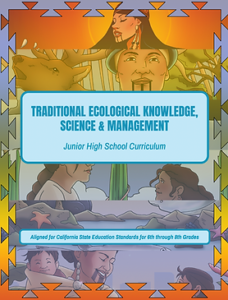
Description:
A series of 6 modules focused on Traditional Ecological Knowledge surrounding fires, forests, water, and fish in Northern California.
Authors/Producers:
Save California Salmon.
Next Gen Science Standards:
MS-ESS3-3 MS-ESS3-4 MS-ESS3-5 MS-LS1-4 MS-LS1-5 MS-LS1-6 MS-LS1-7 MS-LS2 MS-LS3 MS-LS4
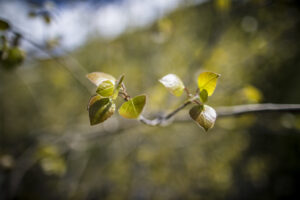
Description:
A series of 10 lessons involving exploring the world around them via “wondering walks”, collecting data from the natural world in order to answer “should we” questions about how we interact with the world. While these lessons are intended for K-2, they could be adapted for a higher grade level.
Authors/Producers:
Learning in Places
Next Gen Science Standards:
K-ESS3-1, KESS3-3, 5-ESS3-1
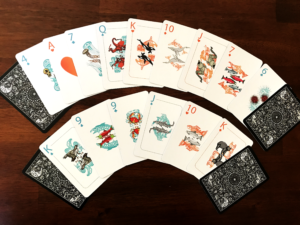
Description:
This deck of playing cards was built to include organisms from the Pacific Northwest. Each card contains original artwork that can be used to analyze traits of organisms across different habitats. Each suit corresponds to different ocean habitats, and the increasing numbers represent increasing trophic levels.
Authors/Producers:
Thayne Yazzie
Next Gen Science Standards:
MS-LS1-6, MS-LS2-2, MS-LS2-1, MS-LS2-3
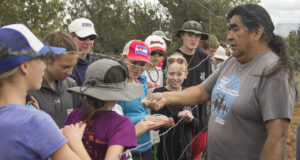 Description:
Description:
This Ebook includes a series of 5 middle school science lessons that examine traditional Pueblo Indian farming techniques. The Ebook also includes descriptions of the ongoing work of The Pueblo Farming Project, a collaboration between the Hopi tribe and the Crow Canyon Archaeological Center that examines traditional Pueblo Indian farming techniques to help us understand ancient farming in the Mesa Verde region of southwestern Colorado.
Authors/Producers:
The Montezuma School to Farm Project and the Crow Canyon Archaeological Center.
Next Gen Science Standards:
MS-LS1-1, MS-LS3-2, MS-LS1-8, MS-LS1-5, MS-ESS1-1, MS-ESS1-4, MS-PS1-4, MS-PS1-2, MS-PS1-5
Colorado State Science Standards:
1.1, 1.3, 2.1, 2.2, 2.4, 2.5, 3.2, 3.3
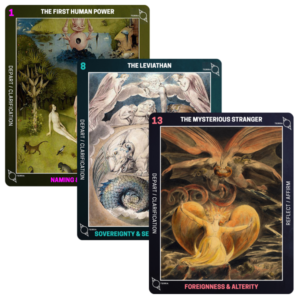
Description:
A 28 card conversation deck with 2 instruction cards used for study, strategy, or play in the classroom, the board room, or the dinner table. The front of each Blueprint Deck card contains a classical image consistent with the theme of that card. Each theme represents big questions that apply to almost any situation and challenges the user to think differently about a complex problem. Our website is launching with this campaign with a copy of our handbook, which describes strategies for using the deck, including games and ways to record a conversation.
Authors/Producers:
Manuel Montoya
Next Gen Science Standards:
N/A (Used as a discussion tool for a variety of topics)
Want to learn more about the Native Climate education group, or collaborate with us on curriculum planning? Please reach out to:
Ileah Kirchoff
Educational Engagement Coordinator
Native Climate
[email protected]